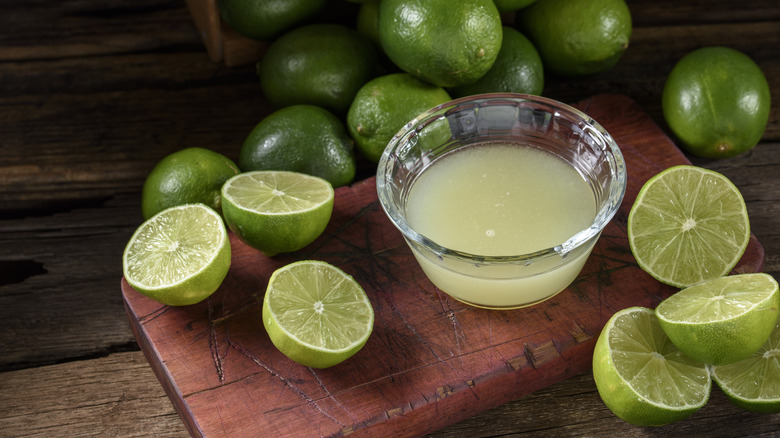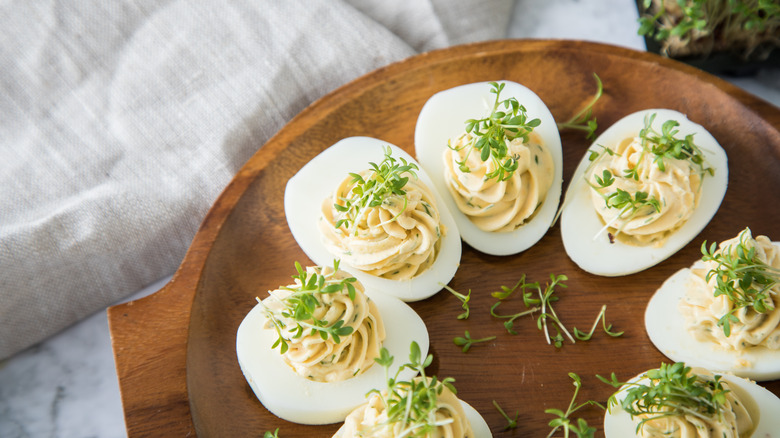Add A Spritz Of Lime Juice To Deviled Eggs For A Bright Zing
Despite now being most commonly associated with a Southern holiday table or a Midwestern picnic, the deviled egg has a long and global history. You can follow the dish back furthest to ancient Rome, where eggs were boiled and served with spices. There were stuffed eggs in Spain in the 13th century, later spreading throughout medieval Europe and across the oceans through the centuries. It wasn't until the late 1800s in the U.S. that mayonnaise was introduced into the recipe, an addition that gained popularity in the 1940s.
Following on from the dish of the 40s, the modern-day classic deviled egg recipe is pretty simple. Although there are many variations, recipes usually take the yolks of boiled eggs and combine them with mayonnaise, mustard, salt, pepper, and paprika for garnish. That mixture is dolloped back into the egg whites — then you can call it a day. The result will be a delicious, crowd-pleasing appetizer.
You don't have to stop there, though. There's one last ingredient you can pull out to add a bright, crisp bite to the mildly tangy eggs. Just a squeeze of lime juice on the finished deviled eggs will enhance the flavors, cutting through the creaminess of the filling to bring out a fresh flavor that you might not expect. This spritz of acid right at the end has the power to combat the rich fattiness of a dish (in this case, coming from the mayo and yolks) to add complexity and a more vivid taste.
You can't go wrong with an acidic finish
Limes are highly acidic, which in culinary terms means that they taste mouthwateringly sour and can enhance dishes that otherwise feel a little flat or even just heavy. That lime juice will enliven the rich, mayo-and-yolk-heavy deviled eggs with only a dash of the citrusy pucker. Sourness, or acidity, is one of the basic tastes — in addition to salty, sweet, bitter, and umami — and the best cooking is often about finding a good balance between these five sensations.
When you're looking for balance, though, lime juice isn't the only culinary acid on offer, and vinegar is another ingredient you'll see used frequently for a little intensity. Vinegar often makes an appearance in deviled egg recipes to add dimension to the heavy, fatty ingredients — just a small amount adds intricacy from behind the scenes. Even with a recipe that puts vinegar in the mixture, though, a spritz of lime juice on the finished product brings the acid front and center, introducing a zest that brightens flavor rather than just rounding it out.
Make your deviled eggs even brighter
A drizzle of lime juice will go a long way toward making deviled eggs the star of the appetizer show, but there's no reason to hold back if you're ready to realize the full zesty, zingy potential. The basic recipe for deviled eggs is quite simple, which means it's easy to tailor to your own tastes with minor modifications. You can start by leaning into the name — the culinary "deviled" means a dish with lots of seasoning and no shortage of spice, so spicy horseradish sauce is a powerful ingredient for deviled eggs that will take their flavor to the next level. Using horseradish sauce rather than basic horseradish is key for adding heat without overwhelming the egg.
Briny flavors make things brighter, too, so get some deviled egg inspiration from the dirty martini. Cocktail onions or olives, as well as some of the brine from the jar, are the perfect pairing for the salty, fatty mayonnaise filling. With a little experimentation and attention to acidic details, it won't take long for you to find your own secret deviled egg ingredients.


